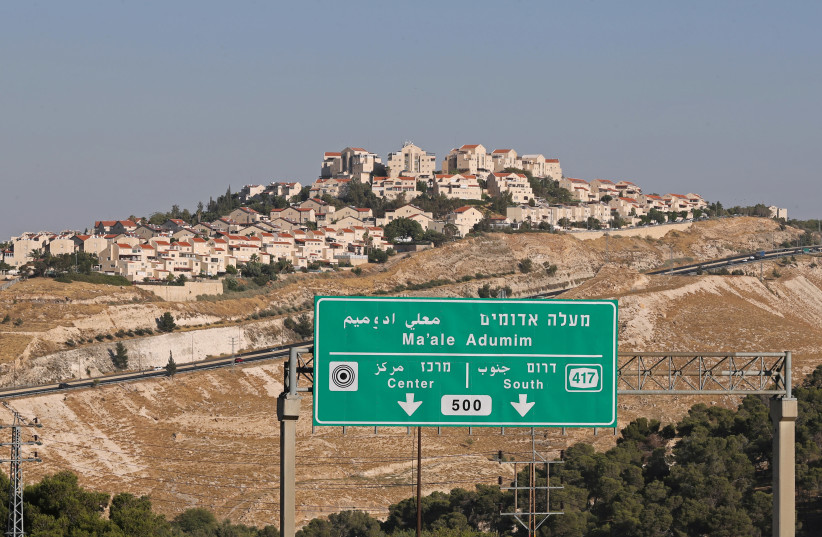Palestinian officials and the Palestinian public are warning that the war in Ukraine will hurt their cause and leave them searching for international attention.
For more stories from The Media Line go to themedialine.org
The Ramallah-based Palestinian Authority has not taken a public position on Russia’s invasion of Ukraine. PA President Mahmoud Abbas and most of the Palestinian leadership have elected to remain silent on the conflict.
Political analyst Nihad Abu Ghosh of Ramallah told The Media Line that Israel is "using
wars to increase settlement building in the occupied West Bank by promoting immigration."
"Since the emergence of the Zionist movement, the Israelis have exploited wars to recruit hundreds of thousands of Jews and replace them for Palestinians," he said.
If the fighting between Russia and Ukraine continues, thousands of Ukrainian Jews are expected to flee the country and immigrate to Israel. Palestinians warn that Israel will send them to live in settlements in the West Bank.

Abu Ghosh says the Palestinians' greatest fear is the resettling of Ukrainian-Jewish
immigrants in West Bank settlements.
"Certainly, this is a source of concern for the Palestinians. We noticed the same thing after the collapse of the Soviet Union in the early 1990s," Abu Ghosh said.
He says the Palestinians’ situation is fragile, and because of that they can't afford to upset anyone. "When the Palestinian economy and Palestinian life depend on international support, this puts the Palestinians in a weaker position than before," he said.
.
He explains that during the coronavirus pandemic, international aid to the Palestinians decreased, in large part because donor countries had other priorities. He expects the same thing will happen now, "because there will be Ukrainian refugees and the reconstruction of Ukraine, and this will push the needs of the Palestinians to the back."
Palestinians say past experience has taught them a lesson "not to interfere or give opinions of what happens elsewhere," according to US-based Palestinian affairs expert Hasan Awwad.
He told The Media Line the Palestinians should refrain from commenting on the war. "The Palestinians, morally and as a matter of principle, can't support any occupation or injustice to any people, especially since they have suffered from displacement and occupation, but regardless of what happens they shouldn’t get involved."
The Israeli government announced in the wake of Russia’s assault on its neighbor that it is ready to absorb thousands of immigrants from Ukraine.
Israeli media have reported that an "emergency plan" is in place to bring in more than 5,000 Jews from Ukraine in one week, which is a much larger number than the country’s Ministry of Absorption is used to.
Awwad says the Palestinian cause derives its position and importance from the world's interest in it, and the war in Ukraine will marginalize the Palestinian cause's global standing.
"The same thing happened during the so-called Arab Spring, when the Palestinian cause lost some of its importance, and was relegated to the back burner," Awwad said.
The Russian invasion of Ukraine carries with it huge risks for a world economy that has yet to fully recover from the pandemic shock. Palestinian economic and financial experts warn the Russia-Ukraine conflict will deal a huge blow to their economy that is already reeling in the aftermath of the coronavirus pandemic and from the decrease in financial aid from international donors.
Ramallah-based economic analyst Thabit Abo Al Ros told The Media Line that the war in
Ukraine threatens the Palestinian’s economic recovery, and could impact growth, inflation and the unemployment rate.
"The Palestinian economy is already struggling, and the war will lead to a spike in the price of several food staples, and shortages of food like flour," Al Ros said, adding that "there are direct effects on the Palestinian economy resulting from the rise in the main commodities that are imported from Ukraine, as many Palestinian companies import directly from Ukraine commodities such as legumes, wheat, flour and oils."
The Palestinian Authority is facing a dire financial situation, including lack of financial aid from donor countries.
He warns that the Palestinian economy is at risk of witnessing its biggest inflation surge in decades.
“The increase in prices will lead to financial inflation from 6% to 7%," Al Ros said.
Observers say high prices will lead to instability.
"We have seen several demonstrations take place throughout the West Bank, and mainly in Hebron because of high prices. If the PA doesn't have a sound economic and financial policy it will lead to more protests," according to Awwad.
Meanwhile, Palestinians have complained about a fuel crisis at several gas stations this past weekend, just days before another rise in the price of gas bringing the price of one liter to 7 shekels ($2.17), the highest price since 2014, and the second price hike since the beginning of this year.
"The alternative market may be the US market, and this will lead to an increase in the cost of transportation, which is already high as a result of the coronavirus pandemic," Al Ros said.
